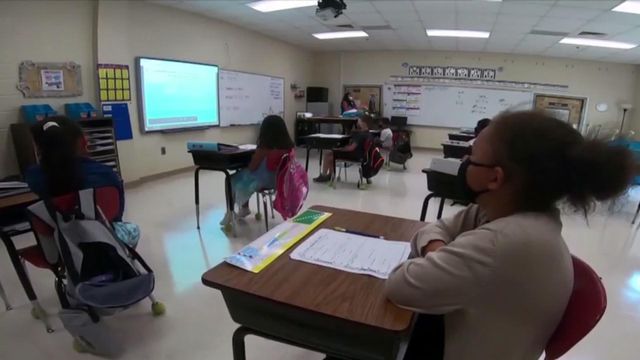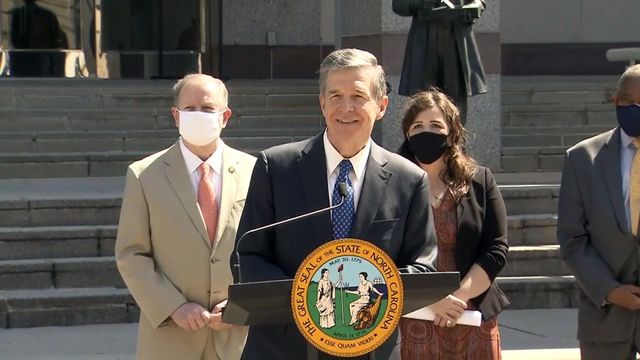Governor, lawmakers reach deal to reopen NC schools amid pandemic
After weeks of jousting and a veto, top legislative leaders and the governor announced a deal Wednesday to reopen North Carolina public schools.
Posted — UpdatedThe plan calls for all elementary schools to open under "Plan A," a category that means full in-person classes without the distancing requirements of "Plan B," which has typically been implemented as a mix of in-person and online instruction to cut class sizes and spread students out.
Middle schools and high schools around the state would pick from Plan A, Plan B or a blend of both under the deal. The difference is based on ages: Older students are thought to transmit the virus that causes COVID-19 more easily than younger children.
Children with IEP or 504 special education plans wouldn't have to move to Plan A if their school stays in Plan B, but parents would have that option.
All grades still have to provide parents with an online-only option.
The deal marks a major change for Gov. Roy Cooper's administration, which just weeks ago, argued that older students follow Centers for Disease Control and Prevention guidelines of 6 feet of distancing, which would make Plan A virtually impossible. Cooper said Wednesday that Dr. Mandy Cohen, secretary of the state Department of Health and Human Services, supports the compromise proposal.
"North Carolina has seen progress in its vaccine distribution," the governor noted, calling it "critical to opening schools to in-person instruction."
But the North Carolina Association of Educators continued to call for extra distance in middle school and high school classrooms.
"This agreement between the governor and leaders in the state legislature will needlessly encourage school boards to push students, educators, and staff into school buildings that do not comply with CDC guidance during a pandemic," NCAE President Tamika Walker Kelly said in a statement. "It is deeply disturbing that the governor and legislative leaders failed to acknowledge the work that educators have been doing to keep students engaged and learning during the worst pandemic in a century while effectively absolving themselves of any further responsibility for the health and safety of our public schools and those who learn and work in them."
Cooper's administration could still shut schools down by order – a key sticking point in the back and forth thus far between the Democratic governor and Republican legislative leaders – but only district by district, not with a sweeping statewide order.
The deal was announced Wednesday morning by a coalition of top state leaders: Cooper, House Speaker Tim Moore, Senate President Pro Tem Phil Berger, state Superintendent of Public Instruction Catherine Truitt and House Minority Leader Robert Reives.
It sped through the legislature, with the Senate passing it unanimously Wednesday afternoon and the House passing it unanimously Thursday morning. Cooper had signed it by Thursday evening.
Schools now have up to 21 days to implement it.
"Some of the districts were moving ahead and already having students back, but some were waiting, and there’s just been an overriding concern that all of these young students need to be back in school," said Moore, R-Cleveland.
Art of compromise
All of the political leaders, often at each other's political throats over some of the weightiest issues that come before state government, were complimentary of the process during a joint press conference that also included key negotiators on the deal, Senate Education Committee Chair Deanna Ballard, R-Watauga, and Senate Minority Leader Dan Blue.
"Coming to agreement after acrimony isn't always easy, but it's the right thing to do for North Carolina," Cooper said.
The governor specifically called Berger and Ballard "honest brokers" on the bill.
"My hope is that this is the beginning of a new level of cooperation between the political parties here, between the Governor’s Office and the General Assembly," said Blue, D-Wake.
How central NC districts have handled reopening
Most systems already offer some version of plans A or B, and more are moving that way. Cooper has urged them to do so for more than a month, but he stopped short of the mandate the legislative majority sought.
Cumberland County Schools Superintendent Marvin Connelly said he expects about 60 percent of the district's 50,000 students to return to in-person learning next Monday.
Middle school and high school students will be divided into two groups, with half attending Mondays and Tuesdays and the other half attending Thursdays and Fridays, Connelly said. Wednesdays will be set aside to disinfect each school.
Students will take online classes on the days they're not in school.
"They need to – have to – learn, go back to their regular activities and be with teachers and spend time with friends," Roca said.
Terry Sanford High School Principal Tom Hatch said safety will be top priority, with temperature checks, frequent hand washing and distancing. While he too is excited about most of his 1,200 students returning, there's also a little anxiety.
"How are we going to adjust with our class sizes and hall traffic and all the logistics that you just take for granted prior to the pandemic?" Hatch said.
Spanish teacher Doug Ginn said he's concerned with trying to teach in person and online at the same time.
"We're all learning, and what I'm hoping to happen is that we can try to keep those at home attentive for part of the time," Ginn said.
Related Topics
• Credits
Copyright 2024 by Capitol Broadcasting Company. All rights reserved. This material may not be published, broadcast, rewritten or redistributed.






